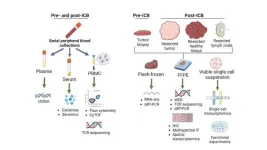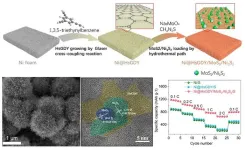(Press-News.org) UCLA-led research suggests that diabetes control can significantly improve for Latinos when a pharmacist implements an intervention that addresses these patients’ barriers to medication adherence.
In this pharmacist-led intervention, pharmacists reviewed the patients’ lab results, vital signs, and barriers to adherence. They then used this information to design a personally-tailored intervention to boost medication adherence and optimize the treatment regimen.
The study is the first to evaluate a collaboration between pharmacist and physicians aimed at improving diabetes care in a large healthcare system among Latino patients, said study lead Dr. Kimberly Narain, assistant professor-in-residence of medicine, division of general internal medicine and health services research, at the David Geffen School of Medicine at UCLA. It uses research methods that account for differences between the people that did and did not receive this collaborative care.
While all patients were eligible for this intervention, the researchers examined only the Latino subset for this study, she said.
“These findings suggest that collaborations between physicians and pharmacists might lead to better diabetes outcomes for some patients, compared to only receiving the usual standard of care from just a primary care physician,” Narain said.
The study will be published Sept. 28 in JAMA Network Open
The researchers wanted to know whether participating in this pharmacist-led intervention is associated with reductions in blood sugar and blood pressure among Latinos with type 2 diabetes.
They compared blood sugar and systolic blood pressure levels across 931 patients treated at UCLA primary care clinics who either did or did not receive the pharmacist-led intervention, using data from the patients’ electronic health records and a research design called “difference-in-differences” that applies strategies to reduce the impact of differences across groups that did and did not receive the intervention in settings where randomized controlled trials can’t be utilized.
The researchers found that patients who had one or more interactions with a pharmacist had an average 0.45% reduction in blood sugar. However, there was no change in systolic blood pressure.
The study has some limitations, among them that the study design may not have captured some non-observable differences across groups that did and did not receive the intervention, a lack of data on the content of the pharmacists’ intervention, and the data years of 2013 through 2018 possibly not reflecting current clinical practice.
But the findings suggest that a pharmacist-led intervention could be a strategy to improve outcomes for not only Latinos, but for all people with type 2 diabetes, Narain said.
“They demonstrate the potential of collaborative care such as this to improve diabetes outcomes, relative to care received from a physician alone, irrespective of ethnicity,” she said. “The magnitude of the difference is consistent with what might be achieved by adding another medication for diabetes. The benefits were observable even after a single visit with a pharmacist.”
Study co-authors are Dr. Gerardo Moreno, Dr. Douglas Bell, Lilian Chen, Chi-Hong Tseng, Dr. Samuel Skootsky, and Dr. Carol Mangione of UCLA, and Rob Follett of University of California Health.
The study was funded by the National Institute on Aging (K08AG068372-01), the National Institute of Diabetes and Digestive and Kidney Diseases to UCLA LIFT-UP (1U24DK132746-01) and the University of California Office of the President.
END
Pharmacist-led intervention can improve medication adherence among Latinos with type 2 diabetes
Latinos with type 2 diabetes are likelier than non-Latino whites to develop complications such as end stage kidney disease, retinopathy and amputation
2023-09-28
ELSE PRESS RELEASES FROM THIS DATE:
Decoding the complexity of Alzheimer’s disease
2023-09-28
CAMBRIDGE, MA -- Alzheimer’s disease affects more than 6 million people in the United States, and there are very few FDA-approved treatments that can slow the progression of the disease.
In hopes of discovering new targets for potential Alzheimer’s treatments, MIT researchers have performed the broadest analysis yet of the genomic, epigenomic, and transcriptomic changes that occur in every cell type in the brains of Alzheimer’s patients.
Using more than 2 million cells from more than 400 postmortem brain samples, the researchers analyzed how gene expression is disrupted as Alzheimer’s progresses. They also tracked changes in ...
Accelerating sustainable semiconductors with ‘multielement ink’
2023-09-28
Key takeaways:
Scientists have developed “multielement ink” – the first “high-entropy” semiconductor that can be processed at low-temperature or room temperature.
Multielement ink could enable cost-effective and energy-efficient semiconductor manufacturing.
The new semiconducting material could accelerate the sustainable production of next-gen microelectronics, photovoltaics, solid state lighting, and display devices.
Semiconductors are the heart of almost every ...
Researchers create first-ever map of a single animal’s early visual system
2023-09-28
Neuroscientists at the Flatiron Institute in New York City and their colleagues have made a big breakthrough using one of the world’s smallest brains.
Using an ion beam, an electron microscope and a lot of patience, the neuroscientists mapped out the entire early visual system — from the eyes that take in light to the neurons processing the information — for a parasitic wasp smaller than a grain of table salt. The feat marks the first time scientists have fully reconstructed such a system at the synaptic level from a single specimen of any animal species, the neuroscientists report ...
Study reveals more depression in communities where people rarely left home during the COVID-19 pandemic
2023-09-28
Key Takeaways
In a survey-based study of US adults, those living in communities in which most people seldom left home at certain times during the COVID-19 pandemic were more likely to report symptoms of depression
The link remained strong even after considering COVID-19 activity, weather, and county-level economics
Accounting for state-level pandemic restrictions only modestly attenuated the association
BOSTON – Higher levels of depressive symptoms have been reported during the COVID-19 pandemic compared with other times in history, and as much as three times higher than prior to the ...
Intense lasers shine new light on the electron dynamics of liquids
2023-09-28
An international team of researchers from the Max Planck Institute for the Structure and Dynamics of Matter (MPSD) in Hamburg and ETH Zurich has now demonstrated that it is possible to probe electron dynamics in liquids using intense laser fields and to retrieve the electron mean free path – the average distance an electron can travel before colliding with another particle. They found that the mechanism by which liquids emit a particular light spectrum known as the high-harmonic spectrum is markedly different from the one in other phases of matter like gases and solids. The team’s findings open the door to a deeper understanding of ultrafast dynamics in liquids.
Using ...
Study helps explain how COVID-19 heightens risk of heart attack and stroke
2023-09-28
In some patients, infection with the pandemic virus SARS-CoV-2 can trigger a dangerous immune response in hardened fatty deposits (plaques) lining the heart’s largest blood vessels, a new study shows.
The findings are based on the body’s immune system, which evolved to destroy invading microbes but also drives disease when triggered in the wrong context. Doing so brings on a set of responses termed inflammation, including swelling, which results as immune cells and signaling proteins home in on infection sites. ...
People who use alternative medicine favor risk and novelty, and distrust science
2023-09-28
Over 40 per cent of Canadians have used at least one risk-associated alternative health-care treatment in the past 12 months, says a new UBC study published in PLOS One.
The researchers explored alternative health-care therapies where the proven benefits do not justify the risks involved. They found that people who access these therapies tend to be wealthier, like novelty and taking risks, and are also more likely to distrust conventional medicine.
The multidisciplinary study between UBC School of Nursing and the University of Alberta Health Law Institute involved a survey of 1,492 Canadians ages 16 and over ...
SARS-CoV-2 infects coronary arteries, increases plaque inflammation
2023-09-28
SARS-CoV-2, the virus that causes COVID-19, can directly infect the arteries of the heart and cause the fatty plaque inside arteries to become highly inflamed, increasing the risk of heart attack and stroke, according to a study funded by the National Institutes of Health. The findings, published in the journal Nature Cardiovascular Research, may help explain why certain people who get COVID-19 have a greater chance of developing cardiovascular disease, or if they already have it, develop more heart-related complications.
In the study, researchers focused on older people with fatty buildup, known as atherosclerotic plaque, who ...
Immune checkpoint blockade prior to surgery promising in multiple cancer types
2023-09-28
Treating cancer with immunotherapies known as an immune checkpoint blockade (ICB) prior to surgery (so-called neoadjuvant immunotherapy) has been a rapidly growing area of research, but the scientific community is just scratching the surface of what is possible, according to a review article co-authored by several current and former investigators from the Bloomberg~Kimmel Institute for Cancer Immunotherapy and the Johns Hopkins Kimmel Cancer Center.
“We consider this approach to cancer immunotherapy to be a gold mine ...
HsGDY on Ni foam for loading MoS2/Ni3S2 to enhance the performance on lithium-sulfur batteries
2023-09-28
They published their work on Sep. 26 in Energy Material Advances.
"The booming progress of electric vehicles demands next-generation energy storage technologies with high energy density, low cost, and longevity." said Lu, a professor at the college of chemistry and chemical engineering in Shantou university. "Lithium-sulfur batteries are identified as a promising energy storage system because of their high ultrahigh energy density and large theoretical capacity. However, they are limited by the poor electronic conductivity of sulfur, volume changes of the cathode, and shuttle effect."
Lu explained that the conversion of polysulfides (Li2Sn, ...
LAST 30 PRESS RELEASES:
Prolonged drought linked to instability in key nitrogen-cycling microbes in Connecticut salt marsh
Self-cleaning fuel cells? Researchers reveal steam-powered fix for ‘sulfur poisoning’
Bacteria found in mouth and gut may help protect against severe peanut allergic reactions
Ultra-processed foods in preschool years associated with behavioural difficulties in childhood
A fanged frog long thought to be one species is revealing itself to be several
Weill Cornell Medicine selected for Prostate Cancer Foundation Challenge Award
Largest high-precision 3D facial database built in China, enabling more lifelike digital humans
SwRI upgrades facilities to expand subsurface safety valve testing to new application
Iron deficiency blocks the growth of young pancreatic cells
Selective forest thinning in the eastern Cascades supports both snowpack and wildfire resilience
A sea of light: HETDEX astronomers reveal hidden structures in the young universe
Some young gamers may be at higher risk of mental health problems, but family and school support can help
Reduce rust by dumping your wok twice, and other kitchen tips
High-fat diet accelerates breast cancer tumor growth and invasion
Leveraging AI models, neuroscientists parse canary songs to better understand human speech
Ultraprocessed food consumption and behavioral outcomes in Canadian children
The ISSCR honors Dr. Kyle M. Loh with the 2026 Early Career Impact Award for Transformative Advances in Stem Cell Biology
The ISSCR honors Alexander Meissner with the 2026 ISSCR Momentum Award for exceptional work in developmental and stem cell epigenetics
The ISSCR honors stem cell COREdinates and CorEUstem with the 2026 ISSCR Public Service Award
Minimally invasive procedure effectively treats small kidney cancers
SwRI earns CMMC Level 2 cybersecurity certification
Doctors and nurses believe their own substance use affects patients
Life forms can planet hop on asteroid debris – and survive
Sylvia Hurtado voted AERA President-Elect; key members elected to AERA Council
Mount Sinai and King Saud University Medical City forge a three-year collaboration to advance precision medicine in familial inflammatory bowel disease
AI biases can influence people’s perception of history
Prenatal opioid exposure and well-being through adolescence
Big and small dogs both impact indoor air quality, just differently
Wearing a weighted vest to strengthen bones? Make sure you’re moving
Microbe survives the pressures of impact-induced ejection from Mars
[Press-News.org] Pharmacist-led intervention can improve medication adherence among Latinos with type 2 diabetesLatinos with type 2 diabetes are likelier than non-Latino whites to develop complications such as end stage kidney disease, retinopathy and amputation



